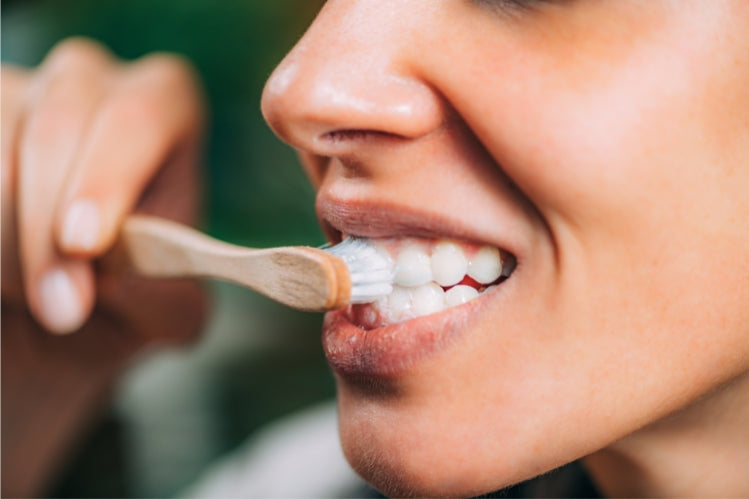Table of contents
Considering aesthetics and appearance, we all desire to have a bright-white smile that enhances our confidence in public. Natural teeth whitening and dental procedures can achieve this goal.
Natural teeth whitening process is an at-home option which has advantages and disadvantages both. In this blog, we will explore all the risks and side effects you need to know before starting this procedure.
What is Natural Teeth-Whitening?
Teeth whitening procedures have gained popularity in recent years due to their ability to improve smiles. It is the procedure of brightening your smile by removing stains from teeth with the help of different techniques at-home.
This treatment involves brightening your smile, avoiding chemical agents. These are easier and free-of-cost remedies to whiten your teeth. Be aware that some procedures may not be suitable for you and can negatively affect your gums For instance, if you have a history of dental treatment, such as root canal or cavity fillings, you need to be more cautious.
Common Natural Teeth Whitening Processes

Following are some teeth whitening processes that are used by people for at-home treatment:
Using Oil
This at-home teeth whitening remedy is done to maintain oral hygiene. A person may rinse the mouth using sesame or coconut oil in order to remove bacteria. This method avoids plaque accumulation and gingivitis which helps in whitening the smile.
Scrubbing Your Teeth
One of the easiest at-home teeth whitening procedures is scrubbing your teeth with grainy textured material. This helps in removing stains from the surface of teeth and brightens your smile. The following things are mostly used in this procedure:
- Baking soda
- Rock salt
- Charcoal
Make sure you scrub your teeth gently, or else it can cause further complications.
Using Strawberry
A non dental material can be used in order to whiten the teeth. According to research, strawberries contain a high amount of malic acid which acts as a teeth whitening agent. Mostly, strawberries are combined with baking soda, which helps in removing stains from teeth. Using this method frequently can damage your teeth hence it is only recommended once in a week.
Side Effects of Using Natural Teeth Whitening Remedies

All these above mentioned methods can be helpful but using them more than usual can lead to following dental issues:
Dry Mouth
When rinsing your mouth with oil is excessively practised, it dries up your mouth. Oil has the tendency to absorb saliva which makes you experience dryness in the mouth.
Gum Irritation
Scrubbing your teeth with baking soda, salt or charcoal can affect your gums. This makes the person go through complications such as swelling and bleeding in the gums.
Teeth Sensitivity
Your teeth are covered with an enamel outer layer which is ruined while using gritty textured material such as charcoal and salt. This makes your tooth sensitive to hot and cold objects. This situation also happens with the use of sugary items such as fruit scrubbing. When your mouth is not rinsed properly after these remedies, it might tear down the protective layer of teeth.
Is Natural Teeth Whitening a Safe Option?
There may be different natural teeth whitening ideas that suit a person's dental condition, so it is important to figure out what suits him best. Before using any of these remedies, it is important to visit your dentist and seek his opinion. He may advise you on treatments by analyzing the severity of your condition.
FAQs
1. Should I avoid tea and coffee for teeth whitening?
If you want to whiten your teeth try avoiding tea and coffee as they are more likely to leave a stain on your teeth.
2. Why is baking soda harmful to my teeth?
Scrubbing your teeth too hard with baking soda can damage tooth enamel, which further leads to tooth sensitivity. Therefore, your orthodontist may discourage using baking soda frequently.
Related Blogs
https://alignerco.fr/blogs/blog/top-foods-and-drinks-to-avoid-for-optimal-dental-health
https://alignerco.fr/blogs/blog/maintaining-dental-and-oral-health-wearing-clear-aligners













